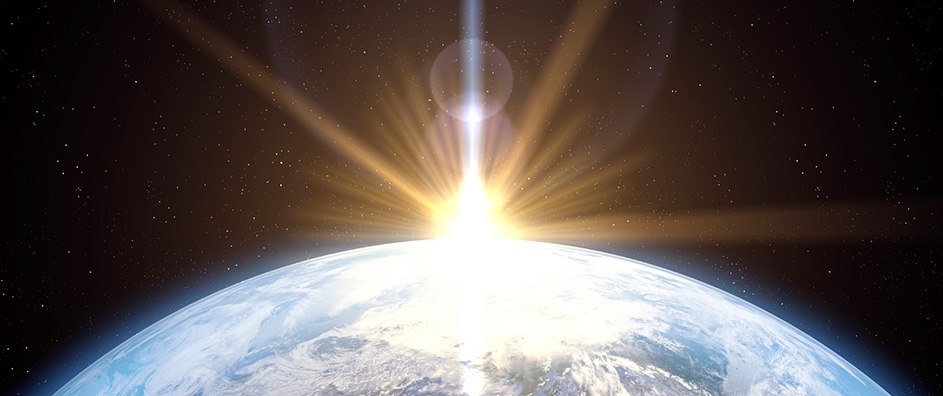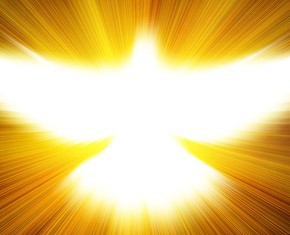The views expressed in our content reflect individual perspectives and do not represent the authoritative views of the Baha'i Faith.
This most elegant system of the sun, planets, and comets could not have arisen without the design and dominion of an intelligent and powerful being. – Sir Isaac Newton
Nature in its essence is the embodiment of My Name, the Maker, the Creator… Nature is God’s Will and is its expression in and through the contingent world. – Baha’u’llah, Tablets of Baha’u’llah, p. 141.
In the 2nd century A.D., a philosopher told the well-known Jewish Rabbi Meir that he did not believe the world was created by God.
The rabbi showed the philosopher a beautiful poem. As the philosopher read it, the Rabbi said it had come into being when a cat accidentally knocked over a pot of ink, “spilling ink all over the document. This poem was the result.”
The philosopher scoffed and said that would be impossible: “There must be an author. There must be a scribe.”
“Then how could the universe come into being by itself?” the Rabbi said. “There must be an Author. There must be a Creator.”
This philosophical tradition, called the teleological argument or the “argument from design”(not to be confused with the pseudo-scientific theory called “intelligent design”) posits a wise, all-knowing and all-powerful Creator, proven from the evidence of the creation itself.
 Socrates, Plato, Aristotle, Plotinus, Cicero, Aquinas, the Islamic theologian Al Ghazali and his philosophical opponent Averroes—all made the teleological argument for the existence of a Supreme Being. The idea itself is likely older than we know, and seems so intuitive to so many people that it has persisted for millennia. It forms one of the main pillars of natural theology, and its logic is simple and hard to refute, especially when combined with the recent discoveries of modern science:
Socrates, Plato, Aristotle, Plotinus, Cicero, Aquinas, the Islamic theologian Al Ghazali and his philosophical opponent Averroes—all made the teleological argument for the existence of a Supreme Being. The idea itself is likely older than we know, and seems so intuitive to so many people that it has persisted for millennia. It forms one of the main pillars of natural theology, and its logic is simple and hard to refute, especially when combined with the recent discoveries of modern science:
The beautiful symmetry and construction of the universe has three possible sources: physical necessity, chance, or design.
We now know scientifically and conclusively that the finely-tuned laws of the universe are not due to physical necessity or chance.
Therefore, the existence of the universe is due to design—which means it has a Designer.
Let’s look at this argument a little more in depth. Recently—probably in just the past three or four decades—scientists have discovered that expressing the laws of nature as mathematical equations produces certain constants, like the gravitational constant. These values, scientists have learned, are actually independent of the laws of nature—and they center themselves in an extremely narrow range of life-permitting conditions. Altering them by even a tiny fraction would upset the balance of nature, and life could not exist. What are the odds of all the physical constants just randomly falling into the tiny, precise range that allows life to exist? So small, scientists say, that they defy calculation.
The Baha’i teachings agree with the teleological argument for the existence of God; and add to it the additional and critically important factor of consciousness:
…nature is subject to a sound organization, to inviolable laws, to a perfect order, and to a consummate design, from which it never departs.
…When you consider nature itself, however, you see that it has neither awareness or will. For instance, the nature of fire is to burn; it burns without consciousness or will. The nature of water is to flow; it flows without consciousness or will… It is therefore evident that the natural movements of all created things are compelled, and that nothing moves of its own will save animals, and, in particular, man.
…Now, can such organization, order and laws as you observe in existence be attributed merely to the effect of nature, notwithstanding that nature itself has neither consciousness nor understanding? It is therefore evident that this nature, which has neither consciousness or understanding, is in the grasp of the Omnipotent Lord, Who is the Ruler of the world of nature and Who causes it to manifest whatever He desires. – Abdu’l-Baha, Some Answered Questions, (newly revised version), pp. 3-4.
When our initial discussion on this subject began, my friend thought of herself as a committed skeptic, someone who had a strongly agnostic view of creation and any possible Creator. The more she thought about the powerful logic of these cosmological, moral, ontological and teleological arguments for the existence of a Supreme Being, though, the more she felt convinced. “I realized,” she told me later, “that my mind had accepted the existence of a Creator. The only thing preventing me from believing in God now were my old childhood feelings about my parent’s traditional religion.”
Of course, those traditional beliefs often characterized God as a fearful, wrath-filled being whose whims and violent temper could lead to natural disasters or instant consignment to an eternal hell. That old conception of a Supreme Being probably came more from clergymen who ruled their flock with fear than it did from the original teachings of the religions themselves—but nevertheless, that simplistic and erroneous concept of a Supreme Being rooted itself in the public consciousness, and culminated in the intellectual and rational rejection of God by many.
Today, open-minded people who carefully consider the arguments of natural theology, and look deeply into the science of the natural universe, will likely discover the same thing my friend did—that they can no longer imagine creation without a Creator.
















Comments
Sign in or create an account
Continue with Googleor